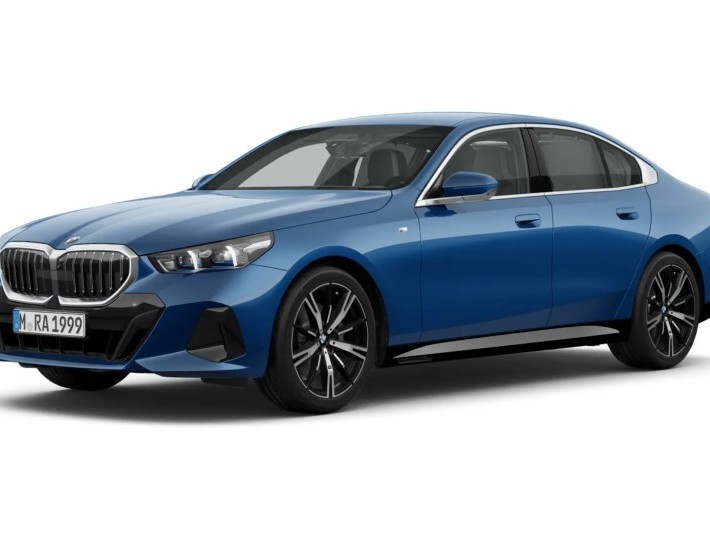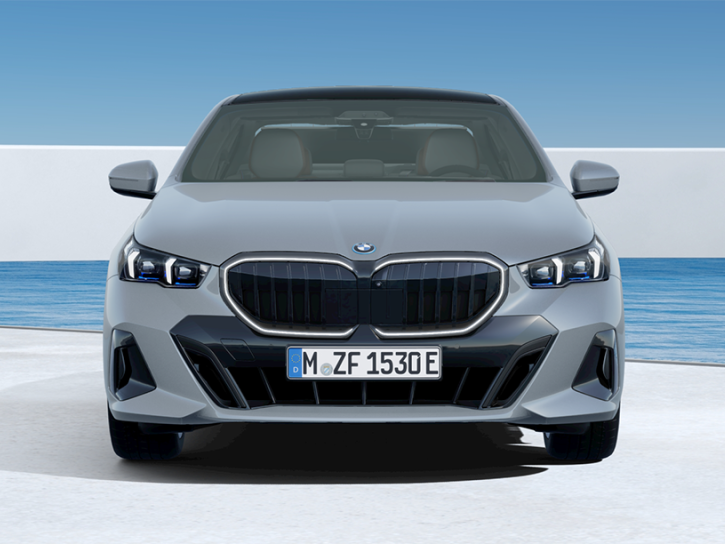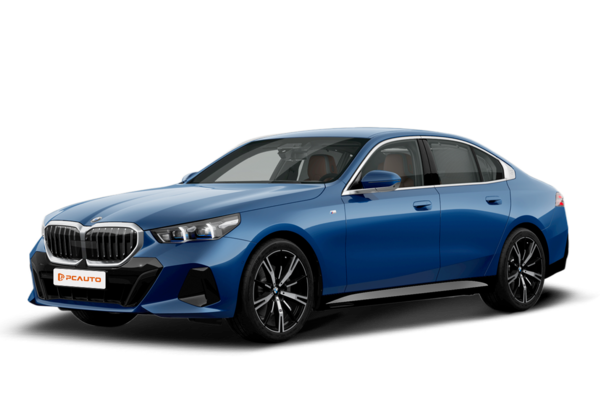Q
How much does a BMW 5 Series 2024 weight?
The weight of the 2024 BMW 5 Series varies by model and configuration, generally ranging from 1,700 kg to 1,900 kg, depending on the powertrain (such as fuel-powered or plug-in hybrid versions) and optional equipment (like all-wheel drive systems, luxury packages, etc.). For Malaysian consumers, this car's weight is above average among luxury sedans in its class, but BMW ensures a balance between driving agility and fuel efficiency through the use of lightweight materials (such as aluminum body components) and efficient powertrain combinations. It's worth noting that vehicle weight affects handling feel and fuel consumption, but the BMW 5 Series has always been known for its precise chassis tuning and power response, delivering an excellent driving experience even with a heavier body. Malaysia's hot and rainy climate places high demands on vehicle cooling and braking systems, and the BMW 5 Series' weight distribution and cooling design have been optimized for such environments to ensure long-term reliability. If you're considering purchasing this car, it's recommended to test drive it at a local authorized dealership to personally experience whether its dynamic performance meets your needs.
Special Disclaimer: This content is published by users and does not represent the views or position of PCauto.
Related Q&A
Q
How many miles can a BMW Series 5 last?
The BMW 5 Series, as a luxury sedan, can typically clock up 200,000 to 300,000 kilometers or more with proper care and maintenance. Its actual lifespan really hinges on your driving habits, how often you service it, and let's not forget Malaysia's road conditions and climate. Sticking to regular oil changes, swapping out filters, maintaining the brake system, and following the manufacturer's recommended service schedule will definitely help your 5 Series go the distance. Malaysia's hot and humid weather can take a toll on rubber components and electronics, so it's smart to keep an eye on those parts. Also, using genuine or high-quality parts and steering clear of cheap engine oil will go a long way in keeping your car performing well and reliable. The 5 Series is known for its solid engineering and durability, and plenty of owners have kept theirs running strong for over 15 years with good upkeep. If you're planning to hold onto it for the long haul, I'd recommend regular professional check-ups at authorized service centers to make sure it stays in top shape.
Q
What is the diesel engine in the BMW 5 Series 2024?
The 2024 BMW 5 Series in the Malaysian market is expected to come with an upgraded B47 2.0-litre four-cylinder turbocharged diesel engine. Renowned for its efficiency and low emissions, this powerplant likely delivers between 190 to 200 horsepower and a robust 400 Nm of torque. Paired with the 8-speed Steptronic transmission, it strikes a solid balance between performance and fuel economy, making it a great fit for both long highway drives and city commutes around Malaysia. BMW's diesel tech focuses on clean efficiency, using common-rail injection and variable turbocharging to meet EU6d emission standards, while keeping maintenance costs relatively reasonable. If you're considering a diesel, it's worth keeping an eye on the Malaysian government's policies regarding diesel vehicles, like road tax and potential changes to fuel subsidies. That said, the diesel engine's strong torque really shines in tropical climates and hilly terrain. Rivals like the Mercedes E-Class or Audi A6 offer similar diesel options too, so it's smart to test drive and compare based on your personal driving style and budget.
Q
How to check mileage on 2024 BMW 5 series?
To check the mileage on a 2024 BMW 5 Series, start by turning on the vehicle. Then, use the multi-function buttons on the right side of the steering wheel or the iDrive controller on the center console to navigate to the instrument cluster menu. Look for the "Vehicle Info" or "Trip Data" section, where you’ll find the "Mileage" display showing both total and trip-specific mileage clearly. For Malaysian owners, BMW’s Digital Cockpit system is pretty intuitive, but if you run into display issues, just refer to the owner’s manual or reach out to your local authorized BMW service center for help. Also, checking your mileage regularly isn’t just about tracking usage—it helps you plan maintenance too, since BMW’s Condition-Based Service (CBS) system automatically calculates when your next service is due based on mileage and vehicle condition. One thing to keep in mind, especially with Malaysia’s hot and humid climate: besides keeping an eye on mileage, make sure to regularly check your tire wear and oil condition to keep your car running at its best.
Q
How tall is the BMW 5 Series 2024?
The 2024 BMW 5 Series stands at 1515 millimeters (around 1.515 meters) in height. This design strikes a balance between maintaining a sporty profile, providing ample headroom, and ensuring driving stability, making it well-suited for Malaysia's diverse driving scenarios. As a luxury midsize sedan, its height is comparable to key rivals like the Mercedes-Benz E-Class or Audi A6. However, BMW's focus on a lower center of gravity enhances handling, which is particularly noticeable on Malaysia's winding mountain roads or city expressways. It's worth noting that this height figure is based on the standard suspension setup; opting for the adaptive air suspension might result in minor variations. For Malaysian buyers, German luxury carmakers typically consider Asian body proportions when designing their vehicles, so even with the panoramic sunroof, the cabin doesn't feel cramped. Japanese competitors in the same class, such as the Lexus ES, tend to be slightly taller by 20-30 millimeters. But German brands place a stronger emphasis on balancing height with aerodynamic efficiency, which is one factor contributing to the 5 Series' impressive 0.27 drag coefficient. When considering a purchase, it's advisable to visit a local BMW dealership for a test drive, as the seat height adjustment range can also significantly impact subjective space perception.
Q
How often should I change the oil in my BMW 5 Series?
For the oil change frequency of the BMW 5 Series, it's best to stick to BMW's official maintenance schedule, which typically recommends changing the oil every 12 months or 10,000 to 15,000 kilometers, whichever comes first. The exact interval can vary depending on the model year and engine type—for instance, turbocharged models might need more frequent changes. Malaysia's hot and humid climate can speed up oil degradation, so if you often drive in congested city traffic or push the car hard, consider shortening the interval to 8,000 to 10,000 kilometers to keep the engine properly lubricated. When choosing oil, always go for BMW-approved fully synthetic oils meeting the LL-01 or LL-04 standards; these handle high temperatures better and offer superior engine protection. Regularly checking the oil level and condition is also crucial—if the oil looks black or has too many impurities, change it early even if you haven't hit the maintenance deadline. Additionally, BMW's CBS (Condition Based Service) system intelligently suggests service times based on driving habits and vehicle condition, which you can check through the iDrive system. Proper oil maintenance not only extends engine life but also improves fuel efficiency and driving smoothness, so don't skip those regular changes.
Q
How much oil does a 2024 BMW 5 Series take?
The engine oil capacity of the 2024 BMW 5 Series (G60) varies depending on the engine model. The common 2.0-liter B48 four-cylinder turbo engine requires approximately 5.25 liters of oil, while the 3.0-liter B58 six-cylinder turbo engine needs around 6.5 liters. Always refer to the vehicle manual or BMW Malaysia's official recommendations for the exact figure. Given Malaysia's hot climate, it's advisable to use BMW-approved fully synthetic oils meeting LL-04 or LL-17FE specifications, such as 5W-30 or 0W-20 viscosity grades. These oils handle high-temperature conditions better and help extend engine life. Regular oil level checks are especially crucial for turbocharged engines since oil not only lubricates but also cools the turbocharger. If the oil warning light appears on the dashboard, check immediately. Notably, overfilling with oil can actually cause reduced performance and carbon buildup issues, so it's best to confirm the oil level using the electronic dipstick or have a professional technician do it. For owners who primarily drive at low speeds in urban areas, consider shortening the service interval to every 10,000 kilometers or 12 months to keep the engine in optimal condition.
Q
What engine is in the BMW 5 Series 2024?
The 2024 BMW 5 Series offers a diverse range of engine options in the Malaysian market to cater to different consumer needs. The petrol variants are expected to come with a 2.0-liter four-cylinder turbocharged engine (B48) and a 3.0-liter inline-six turbocharged engine (B58), both paired with a 48V mild-hybrid system to enhance fuel efficiency and power response. As for the diesel version, it might be equipped with a 3.0-liter inline-six turbocharged diesel engine (B57), also integrated with mild-hybrid technology, making it ideal for users who prioritize efficient long-distance driving. Additionally, the plug-in hybrid model 530e is projected to feature a combination of a 2.0T engine and an electric motor, with an all-electric range of approximately 50-60 kilometers, suitable for urban commuting. It's worth noting that BMW's engine technology has long been renowned for its modular design and efficient power delivery, such as TwinPower Turbo and Valvetronic variable valve technology, which ensure smooth power output and fuel efficiency. For Malaysian consumers, when making a choice, they can consider the sporty performance of the petrol version or the fuel economy of the diesel version based on their daily driving needs. At the same time, there's no need to worry about the engine's heat dissipation and fuel adaptability to the local climate and road conditions, as BMW's global tuning has already taken into account the characteristics of tropical environments.
Q
How big is the gas tank on a 2024 BMW 5 Series?
The 2024 BMW 5 Series has a fuel tank capacity of approximately 68 liters, a design that delivers an extended driving range, perfect for Malaysia's long-distance driving needs. As a luxury sedan, the 5 Series' fuel tank size strikes a balance between performance and fuel efficiency, paired with efficient engine technology to reduce the hassle of frequent refueling. For Malaysian users, this tank capacity is practical for both city commutes and inter-state trips. Additionally, the 5 Series comes equipped with an advanced fuel management system that further optimizes fuel consumption. If you're after even better fuel efficiency, the plug-in hybrid variant is worth considering, offering extra energy-saving benefits in all-electric mode. All in all, the 2024 BMW 5 Series' fuel tank design balances practicality and technology, living up to the brand's usual luxury standards.
Q
How much is the 2024 BMW X5 series?
The 2024 BMW X5 lineup in Malaysia comes with varying price tags depending on the model and specs. The base X5 xDrive40i M Sport starts at around RM 500,000, while the high-performance X5 M60i xDrive pushes close to RM 700,000 – though actual prices might shift a bit based on optional extras or ongoing promotions. Under the hood, this luxury SUV packs either a 3.0-liter inline-six or a 4.4-liter V8 turbo engine, paired with a 48V mild-hybrid system. That means you get plenty of power without sacrificing fuel efficiency, and with standard xDrive all-wheel drive plus adaptive suspension, it’s ready for Malaysia’s mix of road conditions. Local buyers also score a 5-year unlimited mileage warranty and free regular servicing from BMW Malaysia. Toss in the signature premium interior and the latest iDrive 8.5 system, and the X5 lineup is a solid contender in the luxury SUV space. If you’re watching the budget, keep an eye on the official certified pre-owned program or check out financing options to ease the upfront cost.
Q
What is the difference between the 2024 and 2025 BMW 5 Series?
There are some differences between the 2024 and 2025 BMW 5 Series models. In terms of pricing, the 2024 520i starts at RM 332,800, with the 520i M Sport variant coming in at RM 349,800. The 2025 530i M Sport, on the other hand, is priced at RM 399,800.
Under the hood, the 2024 520i engines deliver either 210PS or 208PS, while the 2025 530i M Sport ups the ante with a 258PS powerplant. Performance-wise, the 2024 models top out at 230km/h and sprint from 0-100km/h in 7.5 seconds. The 2025 model pushes that top speed to 250km/h and shaves the 0-100km/h time down to just 6.2 seconds.
Looking at the specs, some 2024 trims have rear seats with manual adjustments or fixed configurations, whereas the 2025 model gets a 40:20:40 split-folding rear seat setup. Audio systems also see an upgrade: most 2024 models feature Harman Kardon speakers, while the 2025 model steps up to a Bowers & Wilkins surround sound system.
Additionally, the 2025 5 Series hit dealerships on March 13, 2025, and comes with a 2-year unlimited mileage warranty. The 2024 models first arrived on September 2, 2024.
Latest Q&A
Q
What is the engine of Proton X50?
The Proton X50 is powered by a 1.5-liter turbocharged direct-injection (TGDI) three-cylinder engine, co-developed by Proton and Geely. This engine comes in two tuning versions: the standard variant delivers 150 horsepower and 225 Nm of torque, while the Flagship trim ups the ante to 177 horsepower and 255 Nm. It's mated to a 7-speed dual-clutch transmission (DCT), striking a balance between performance and fuel efficiency.
Under the hood, the engine borrows technology from Geely's BMA modular platform, featuring lightweight construction and direct fuel injection. These advancements help keep fuel consumption in check and ensure compliance with Malaysia's stringent EURO 4 emission standards. A notable point is that Proton has tweaked the engine specifically for local conditions – think a cooling system and ECU calibration optimized to handle our hot and humid weather. Plus, owners can run it on RON 95 petrol, which helps keep day-to-day running costs down.
For Malaysian buyers, small-displacement turbo engines like this have been gaining traction as the market favorite in recent years. Compared to traditional naturally aspirated engines, they deliver more torque at lower revs, making them well-suited for city driving. While three-cylinder setups do involve a slight trade-off in terms of smoothness, the use of a balance shaft has significantly reduced vibration issues. What's more, maintenance costs are on par with those of four-cylinder engines.
Q
Will the X50 facelift have a new engine?
As for whether the facelifted X50 will get a new engine, there's no official word yet. But looking at Proton's usual update strategy, facelifts typically focus more on tweaks to the exterior, interior, and features. The engine is likely to stay the same: the existing 1.5T three-cylinder turbo setup. It's proven itself reliable in the Malaysian market, and with its fuel efficiency plus 147hp/226Nm output, it fits the B-segment SUV bill. If you're craving more power, keep an eye out—Proton might roll out a high-performance variant or a hybrid model down the line. After all, the global trend is going electric, and local brands are also ramping up their new energy tech game. Best bet is to check Proton's official website or local Malaysian auto media for the latest scoop. And a quick tip for car buyers: beyond just power figures, factor in real-world stuff like maintenance costs and after-sales network. At the end of the day, the long-term ownership experience is what really matters.
Q
Which country made Proton X50?
The Proton X50 is a compact SUV co-developed and produced by Malaysian national automaker Proton and China's Geely. Its manufacturing base is located in Tanjung Malim, Perak, Malaysia. Based on Geely's Binyue platform, the model has undergone several localized adaptations for the Malaysian market, including right-hand drive configuration, safety features compliant with local regulations, and an air conditioning system tailored for tropical climates. The Proton X50 is powered by a 1.5-liter turbocharged engine and offers multiple driving modes, balancing performance with fuel efficiency. As a key strategic model for the Proton brand, the X50 has gained popularity among Malaysian consumers thanks to its high value for money and rich technological configuration, such as the advanced driver assistance system (ADAS) and smart connectivity features, further solidifying Proton's competitiveness in the local market. Notably, the collaboration between Proton and Geely has not only enhanced the technical content of the X50 but also driven the upgrading of Malaysia's automotive industry chain, with increasing local production ratios creating more job opportunities and facilitating technology transfer locally.
Q
Is the Proton X50 engine a VOLVO?
The Proton X50's engine isn't directly sourced from Volvo. Instead, it's built based on the modular architecture technology co-developed by Geely and Volvo. Its 1.5-liter three-cylinder turbocharged engine is part of the "Drive-E" powertrain family jointly developed by Geely and Volvo, but Geely took the lead in tuning it to suit Malaysian market needs. This engine incorporates some of Volvo's technical patents, such as direct fuel injection and lightweight design, though the production line and supply chain are independently managed by Geely's system. It's worth adding that the X50's powertrain has undergone local adaptation, including cooling system optimizations for tropical climates and adjustments for RON95 gasoline compatibility, which differ from the calibration of Volvo's original engines. Malaysian owners will notice Geely badges in the X50's engine bay rather than Volvo logos, but the technical origins do reflect the synergy following Geely's acquisition of Volvo. This kind of technology-sharing model is common in the automotive industry – for example, multiple brands under the Volkswagen Group also share engine platforms, which helps reduce R&D costs while ensuring core performance.
Q
Is the X50 a good car to buy?
The Proton X50 is an SUV that Malaysian consumers should definitely consider. It offers solid value for money and competitiveness in the local market. Under the hood, it's powered by a 1.5-liter turbocharged engine, available in two power tunes: the standard variant puts out 150PS, while the performance version cranks it up to 177PS. Both are mated to a 7-speed dual-clutch transmission, delivering smooth power delivery and decent fuel efficiency—perfect for city commutes and long drives alike.
The X50 doesn't skimp on features either. It comes loaded with goodies like Advanced Driver Assistance Systems (ADAS), a panoramic sunroof, a digital instrument cluster, and smart connectivity functions, which really shows Proton's commitment compared to its rivals. Plus, as a homegrown brand, Proton has an edge with its after-sales service network and parts availability, keeping maintenance costs relatively low—something Malaysian buyers definitely care about.
Of course, before making a purchase, it's always a good idea to take it for a test drive to see if the suspension setup and noise insulation meet your personal taste. You might also want to check out competitors like the Honda HR-V or Toyota Corolla Cross, then pick the one that best fits your budget and needs. All in all, the X50 strikes a nice balance between performance, features, and price, making it especially appealing to young families looking for a tech-savvy and practical ride.
View MoreRelated News

BMW 5 Series Review: Luxury Shaped by Cutting-Edge Tech
JamesMay 7, 2025

The official price of the brand-new BMW 5-Series (G60) has been announced, 3,779,000-3,949,000 Thai Baht
Kevin WongMar 11, 2024

Neue Klasse platform's first mass-produced vehicle, the all-new BMW iX3 makes its debut, looks just like a concept car
LienSep 8, 2025

BMW X5 will become BMW's first model equipped with a hydrogen fuel cell, with a range of 504 kilometers
JamesSep 8, 2025

BMW's all-new iX3 to be unveiled on September 5, built on the Neue Klasse platform
Kevin WongSep 1, 2025
View More

















Pros
Cons